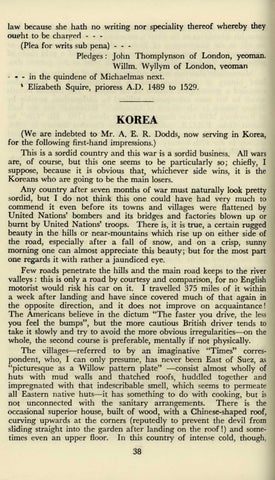law because she hath no writing nor speciality thereof whereby they °wilt to be charp-ed - - (Plea for writs sub pena) - - Pledges : John Thomplynson of London, yeoman. Willm. Wyllym of London, yeoman - - in the quindene of Michaelmas next. Elizabeth Squire, prioress A.D. 1489 to 1529.
KOREA (We are indebted to Mr. A. E. R. Dodds, now serving in Korea, for the following first-hand impressions.) This is a sordid country and this war is a sordid business. All wars are, of course, but this one seems to be particularly so; chiefly, I suppose, because it is obvious that, whichever side wins, it is the Koreans who are going to be the main losers. Any country after seven months of war must naturally look pretty sordid, but I do not think this one could have had very much to commend it even before its towns and villages were flattened by United Nations' bombers and its bridges and factories blown up or burnt by United Nations' troops. There is, it is true, a certain rugged beauty in the hills or near-mountains which rise up on either side of the road, especially after a fall of snow, and on a crisp, sunny morning one can almost appreciate this beauty; but for the most part one regards it with rather a jaundiced eye. Few roads penetrate the hills and the main road keeps to the river valleys : this is only a road by courtesy and comparison, for no English motorist would risk his car on it. I travelled 375 miles of it within a week after landing and have since covered much of that again in the opposite direction, and it does not improve on acquaintance ! The Americans believe in the dictum "The faster you drive, the less you feel the bumps", but the more cautious British driver tends to take it slowly and try to avoid the more obvious irregularities—on the whole, the second course is preferable, mentally if not physically. The villages—referred to by an imaginative "Times" correspondent, who, I can only presume, has never been East of Suez, as "picturesque as a Willow pattern plate" —consist almost wholly of huts with mud walls and thatched roofs, huddled together and impregnated with that indescribable smell, which seems to permeate all Eastern native huts—it has something to do with cooking, but is not unconnected with the sanitary arrangements. There is the occasional superior house, built of wood, with a Chinese-shaped roof, curving upwards at the corners (reputedly to prevent the devil from sliding straight into the garden after landing on the roof !) and sometimes even an upper floor. In this country of intense cold, though, 38






















